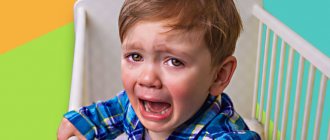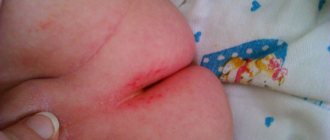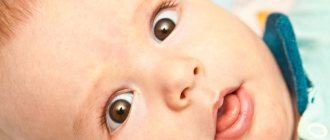Possible reasons
Unlike the brain, the central nervous system of 3-year-old children is still developing, so pathological speech development can be easily corrected through intensive training.
Physiological reasons:
- alalia sensory or motor;
- tempo delay;
- GSD (general speech underdevelopment);
- pathologies of chromosomal type;
- congenital diseases;
- hereditary predisposition;
- pathological disorders in the mother during gestation;
- brain injury;
- hypoxia;
- fright;
- thrombophlebitis;
- gestosis;
- placental abruption;
- maternal abuse of alcohol, drugs, and tobacco during pregnancy;
- autism;
- impaired hearing;
- congenital muteness;
- premature birth.
Social:
- The baby has no incentive to talk. This happens when parents are overly caring, when they take care of the child so much that he does not need to point out his own desires to his mother (she understands him by gestures).
- No motivation to babble. The reason is lack of attention from relatives. Parents do not talk to their child and leave him alone for a long time.
- The parents speak two languages - the child, due to his age, is not able to simultaneously learn words from different dialects, so he prefers to remain silent.
- Lack of company - parents do not take their children to playgrounds, do not send them to nurseries and kindergartens, although children develop faster in the company of peers.
Psychological:
- the child is in a stressful state for a long time when he constantly hears quarrels between relatives and experiences beatings;
- increased demands of parents - after the first word spoken, they constantly ask to repeat it (pressure has the opposite effect).
Warning signs
It is urgent to seek medical help in cases where the baby exhibits the following signs:
- limited vocabulary: the child speaks mainly nouns, very rarely verbs;
- illegibility of words (it feels like an unknown foreign language);
- cannot answer some questions - how old he is, what his name is, etc.;
- pronunciation of small phrases (maximum 2-3 words);
- lack of desire to repeat words and sentences after adults;
- distortion of sounds - instead of one letter, the child says another (dough - kesto, chicken - turitsa);
- The location of the tongue when pronouncing words is between the teeth.
Sometimes the child has no reaction to being called. This happens when hearing is impaired. Speech correction is possible only after hearing problems have been cured.

Child development stages
In mental development, children go through several stages, and they go through them in different ways. Some crawl until they are one and a half years old, while others do not crawl at all; some babies erupt teeth at three or four months, while others only get their first tooth when they are one year old. Although, of course, certain developmental norms exist, and pediatricians and neurologists use them to assess the condition and development of the baby. According to these standards, “babble” should appear in a child’s speech as early as 6-7 months, and by the age of one year the baby should repeat several words. However, many factors influence the development of a child: pregnancy, childbirth, lifestyle and even gender. For example, boys, as a rule, begin to speak later than girls of the same age. In addition, boys are more likely to have speech problems. This is due to genetic factors. Heredity also plays an important role: if one of the parents spoke late, then the child will most likely experience a speech delay. And these are all variants of the norm.
Parents who closely monitor the development of the child should consult a doctor if, at the age of 1.5 years, the baby does not understand simple words (his name and the names of surrounding objects), and at the age of 2 years, he does not try to repeat words. Children's inability to form two-word phrases at 2.5 years of age and their inability to pronounce simple sentences at 3 years of age should also be a major concern for parents. Speech development delays are recorded in 2-4% of children.
But if even after 3 years the child does not speak even simple sentences, you can forget about the normal version. However, experts do not advise waiting until 2-3 years of age and suggest starting classes with the child already in infancy, at 7-8 months, when the baby begins to understand speech addressed to him.
Some mothers are glad that their children very early (about 1-1.5 years) begin to speak in correct sentences, using a fairly extensive vocabulary. However, such phenomena often lead to a breakdown of the nervous system. Such children need rest, walks in the fresh air, a minimum of impressions and moderate conversations.
Speech development standards
Each child develops speech differently - some babies immediately pronounce words, others only syllables. But in general the development goes like this:
- start of walking – 3 months;
- active babbling – from 6 to 8 months;
- a girl's first word is 10 months, a boy's first word is a year;
- pronunciation of 10 words – one and a half years;
- increasing the number of words, knowledge of pronouns – 2 years;
- minimum 350 words, declension ability – 3 years.
Existing norms for 3 years of age:
- the child is well versed in his age, name and other personal information;
- knows how to inflect words by case, number and gender;
- number of words in a sentence – at least 3;
- the child can pronounce multi-step phrases - put the construction set in a box, put the box on the table, etc.;
- vocabulary consists of nouns, pronouns, adverbs and other forms;
- ability to count;
- the baby says what he is doing or seeing at the moment;
- shows interest in reading, books, pictures;
- easily remembers poems and fairy tales, and then tells them.
There are no strict parameters for all children, because each baby is individual. If parents have doubts about their child’s speech development, they should seek help from a specialist.
Why a child does not speak by the age of 2: reasons according to Komarovsky
There is no need to worry too much if by the age of 2 the child still does not speak. This situation does not necessarily lead to big problems. It may also turn out that there is no reason to raise the alarm and drag the baby to the doctors. Komarovsky identifies the following reasons for the “silence” of a two-year-old child.
- Problems in the functioning of the hearing organs. It is not difficult to identify this cause, because with hearing damage, the child will not even understand speech.
- Pronounced heredity. A child often does not speak by the age of 2, because he received “silence” from his parents. If the situation persists until the age of 3, then it is worth showing the child to a specialist.
- Weakness of the body. A variety of phenomena lead to the fact that a child lags behind in development. The delay in the maturation of the central nervous system is compensated over time.
- Psychological trauma. According to Komarovsky, sometimes children do not speak until they are 2 years old because they suffered a severe fright at an early age.
- Overprotection on the part of adults. Children may not talk for a very long time if they simply have no reason to do so. A child whose wishes are immediately guessed does not need to voice them.
As you can see, in most cases, the lack of speech in a child of 2 years is a completely safe phenomenon. But still, sometimes it is impossible to do without special measures. Komarovsky talks about certain methods of intervention to stimulate the baby to start talking. It is useful to consider them.
Which specialist should I contact?
In case of speech disorders, parents should initially bring the child to the pediatrician. This specialist conducts a comprehensive examination and establishes a primary diagnosis. Next, the baby is referred to narrowly specialized doctors:
- otolaryngologist - examines ears, tests hearing;
- speech pathologist – assesses the development of the speech apparatus;
- a neurologist identifies etiology that is directly related to pathological disorders in the nervous system;
- a speech therapist determines the level of development of sound pronunciation;
- psychologist identifies mental disorders.
What to do if a child at 3 years old does not speak?
The speech sphere is formed by qualified specialists, and parents should also take an active part in this. The treatment method is selected based on the cause of speech delay, so the approach is always individual.
The well-known doctor Komarovsky in his video gives useful recommendations on what to do to get the baby to talk:
Medical techniques
Drug therapy involves taking medications, injections and physical therapy. Thanks to this, speech and the cerebral hemispheres are activated, and the functionality of the nervous system is restored.
Preparations:
- Pantogam.
- Encephabol.
- Neuromultivitis.
- Cortexin.
- Medicines based on glycine and iodine.
Physiotherapeutic procedures include massage, magnetic therapy, and electrical stimulation.
Pedagogical approach
Pedagogical methods of therapy involve speech correction through the development of fine motor skills. The following games are used for children:
- special charging;
- finger and shadow theater;
- modeling figures from plasticine, clay, ordinary dough;
- feeling the sand, working with water, cereals.
Other methods:
- dramatization of fairy tales;
- learning songs, poems;
- retelling stories;
- compiling stories based on someone’s actions, illustrations.
The following actions are also important:
- Kids should definitely ask questions, but do it casually. That is, without looking point blank and without demanding a strict answer. For example, if you need to dress a child, you can ask him to bring a jacket, and then ask what kind of jacket he brought (what color it is). The questions should be alternative - such that the baby cannot remain silent: what will you drink - tea or milk?
- Creating situations in which the child must ask for something. For example, play active games with him, after which he will want to drink (do not offer water yourself, you need to wait for the moment when the baby himself makes the request).
- When the child plays, the mother should encourage action with a word (say that it is time for the doll to sleep, and for this she needs to tell a fairy tale, sing a lullaby).
- You need to read poems and books out loud more often. It is especially important not to finish the sentence, but to ask your daughter or son to finish it.
- Parents should comment on their actions by speaking loudly and clearly. If you are walking with your baby in the park, be sure to focus on what is around – what trees and shrubs grow, what birds and other animals there are, swings, etc.
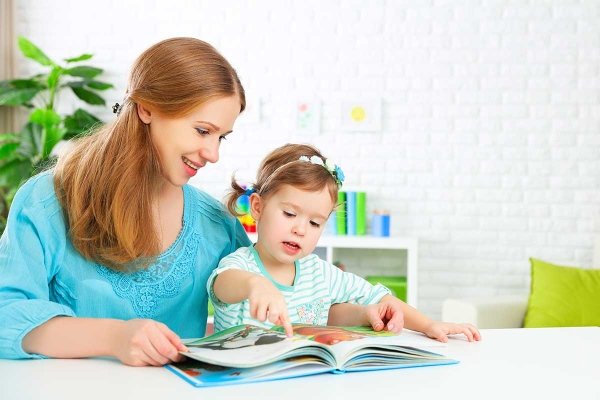
Corrective methods
Correction methods are used in specialized institutions - kindergartens. A speech therapist works with children using certain methods. More often this is logorhythmics, which is a set of activities - chanting, pronouncing phrases to musical accompaniment. In this case, hand gestures are required. All this allows you to solve several complex problems at the same time - coordination of hand movements, perception of phonetics and articulation. In addition, hearing and rhythm develop, the child becomes more sociable and open.
Other corrective techniques:
- classes on developing sounds by supporting the scapula;
- imitation;
- onomatopoeia;
- logarithmic exercises.
Children respond best to speech correction when they are all together. This is due to the fact that they try to communicate with each other, and even created conflict situations contribute to the formation of speech (the baby is forced to speak).
Tips for parents
Parents at home should adhere to some rules that will allow the baby to start speaking faster. Therefore, experts recommend the following:
- It is important to explain to your child the functional features of objects. For example, why do you need a TV, how does a telephone work, what is done with an iron, etc. During this process, the baby will have questions that he will ask completely unconsciously.
- Always pronounce words clearly and correctly. Future vocabulary and pronunciation depend on this.
- When reading children's books, ask your child to repeat this or that phrase or explain the meaning, citing the fact that you did not understand anything.
- Do not allow you to sit for a long time playing computer games or watching TV alone - the child will be silent during this time.
- When watching cartoons in general, comment on the actions of the characters.
- Collect puzzles together and play educational games.
- From birth you need to talk to the baby, which will teach him to listen carefully to you and perceive speech. There is no need to coo with him and pronounce words incorrectly. Strictly follow all the instructions of specialists, spend more time with your baby.
- An excellent solution for developing speech skills is visiting public places, zoos, and attractions.
- It’s always interesting to say tongue twisters, so get your child used to them.
- Choose rhymes with your child. This will captivate him.
- To develop fine motor skills, you can learn to tie shoelaces and draw on paper with paints using your palms and fingers.
- If your child attends a child care facility, be sure to notify the teacher about the existing problem.
- Quite often, when children speak with mistakes, parents constantly correct him, and do it rudely and harshly. As a result, the baby becomes reluctant to talk and begins to give answers like “yes” or “no.” It is strictly forbidden to do this - you need to support the child.
- If children silently ask for something (with gestures, etc.), you should not fulfill such requests - wait until he says his desire out loud.
Exercises and games for speech development
Doctors recommend developing speech and fine motor skills with the following exercises:
- To train the muscular system of the palate, lips, and tongue (these organs are responsible for pronunciation), you need to make grimaces. It is useful to stretch out your lips with a tube, stretching your smile. The number of classes per day is at least 10 minutes.
- The hands directly depend on speech motor skills, since impulses from both parts enter the brain, triggering speech processes. Therefore, you can develop fine motor skills with the help of a miniature Lego constructor. For the same purposes, you can string beads on a thin thread, fasten and unbutton clothes, etc.
- Massage is also an exercise game. Parents must do it themselves. To do this, you need to stroke your palms in a circle, up/down, touching your fingers. After light stroking, rubbing movements are performed. Don't forget to lubricate the handles with nourishing cream or massage oil.
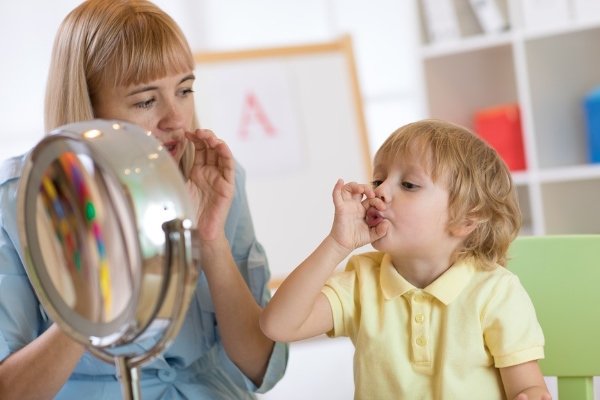
other methods
In complex therapy, other effective methods of speech development are used:
- There is an experienced psychologist-educator O. E. Gribova, who created the unique book “What to do if your child does not speak.” The special feature is to teach the baby to speak with the help of games that bring joy.
- Another book “Help your baby talk.” It was written by Yanushko E., who focuses on the relationship between parents and children. Moms will receive plenty of advice on how to best engage their child.
- You can use the finger play training method by reading the manual “A Child Learns to Speak,” which was written by two authors - Ruzina and Koltsova. The basis is activities on the development of fine motor skills.
- Get a pet that your baby will interact with and talk to.
Why the child does not speak: probable reasons
Most often, the problem develops under the influence of several factors. Often, congenital anomalies are supplemented by the parents’ incorrect behavior and reluctance to communicate with the baby at a sufficient level.
If you notice that your daughter or son doesn’t talk much, think: the child cannot pronounce certain sounds (words) or simply does not want to communicate, prefers to remain silent. Neurological disorders may exist and medical attention is required. Sometimes children feel comfortable without saying unnecessary phrases and answer in short words. Without parental encouragement, kids are unlikely to rant or think about anything interesting.
Main reasons:
- birth injuries. Unfortunately, during a difficult birth, certain areas of the baby’s brain are sometimes damaged. Such children require special attention from parents and doctors. In most cases, deviations are noticeable in the first year of life. A prerequisite is constant monitoring of the development of the newborn. In addition to the pediatrician, parents should regularly show the baby to a pediatric neurologist to monitor brain activity;
- hearing problems. Attentive parents will pay attention to the first signs of violations from the first month of their baby’s life. Congenital deafness or partial hearing loss occurs due to negative effects on the fetus during pregnancy. Sometimes the cause of the pathology is a hereditary predisposition;
- childhood autism. Every year there are more and more children living in “their own world.” An autistic child is often a normal child, but completely self-absorbed. He simply does not need to communicate with others, the baby does not suffer, and is in no hurry to speak. The problem of autism is dealt with by a psychologist, child neurologist and psychotherapist. The role of parents is no less important;
- lack of attention, deficit of verbal communication. Some parents do not know that they themselves raised a “silent child”. Reluctance to talk to a child, constant shouting, harmful words and phrases “Shut up, I’m tired,” “What nonsense are you talking about,” “We’ll talk later,” “Don’t pester me with stupid questions,” and similar statements discourage children from wanting to talk. A child sitting quietly in the corner, not disturbing anyone, is an ideal picture for many parents. In fact, psychologists warn about the danger of “withdrawal,” delayed speech development, stiffness, and problems in the future;
- refusal of “live” communication. Many parents, due to fatigue (laziness/lack of understanding of the importance of contact with their child), replace reading books together, learning poems, songs, and emotional conversation with TV, a computer, or a tablet. Modern gadgets captivate the child and relieve parents, who do not need to answer endless “Why?” Psychologists quickly “figure out” children with whom they have not worked much. The lack of live communication negatively affects the emotional development of the baby and delays speech development.
READ ALSO: How to provide first aid and what to do if a child is sunburned: ointments and creams, folk remedies for sunburn
Forecast
Teaching a child to speak after the 3-year mark is quite difficult, so it is necessary to pay attention to his speech abilities as early as a year. If you provide timely medical care and strictly follow all medical recommendations, then the prognosis is considered favorable, even if the cause is a pathology of the central nervous system, brain, etc. In almost 90% of cases, the child begins to actively talk.
If you cannot solve the problem yourself, be sure to contact a specialist. Do not hesitate to visit a psychologist who will provide qualified assistance to both the baby and you (teach you how to communicate correctly with the child, instill speaking skills, and treat the problem calmly). And then your child will start talking.
What to do: examinations

If the child does not speak, it is necessary to contact specialists: pediatrician, neurologist, otolaryngologist, speech therapist, child psychologist.
If the child is 3 years old and the parents have suspicions that the reason for his lack of speech lies precisely in physiology, it is important to conduct a timely examination of the child and identify pathologies.
Which specialists should you contact:
- Pediatrician: will assess the baby’s general health and refer you to more specialized specialists.
- Neurologist: will determine the pathology based on an analysis of the prenatal period of the child’s development, assess the current state of development of higher mental functions, prescribe the necessary additional examinations (MRI, EEG, ultrasound scan) and the necessary drug treatment.
- Otolaryngologist (ENT): will check the state of hearing, conduct the necessary examinations (do an audiogram, check the hyoid frenulum).
- Speech therapist: will conduct testing and determine the level of speech development.
- Psychologist: will rule out the presence of mental disorders, determine if a child does not speak at 3 years old, whether psychological factors could be the cause, and draw up a correctional program of classes.
What doctors can prescribe:
- Medications. If a child at 3 years old is silent or speaks poorly, a neurologist can prescribe medications that nourish the neurons of the brain and stimulate the speech areas of the brain (cortexin, cogitum, encephabol, neuromultivitis).
- Physiotherapy (microcurrent reflexology, light therapy, acupuncture).
- Speech therapy massage of the tongue, lips, cheeks, earlobes, hands.
- Psychocorrectional sessions with a neuropsychologist.
Doctors' opinion
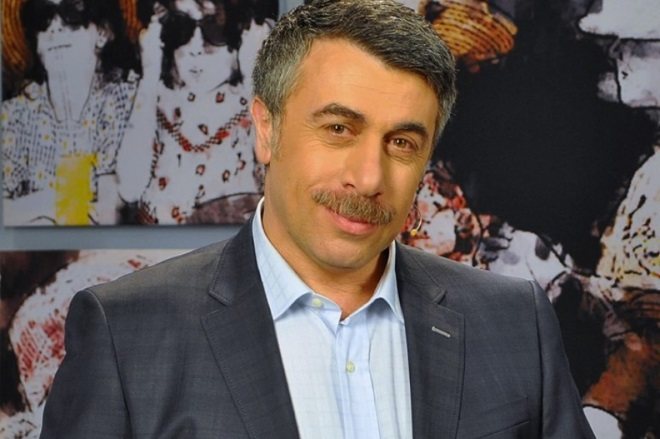
Dr. Komarovsky, a well-known pediatrician, recommends that parents spend more time with their children and also limit their children’s use of tablets and phones.
Dr. Komarovsky believes that it is not always necessary to sound the alarm if a child speaks poorly. Evgeniy Olegovich notes that the development of speech of each child is individual and largely depends on temperament. Lively, emotional children begin to speak earlier, calm, phlegmatic children begin to speak later.
According to the doctor, if the child does not have any obvious deviations, it is very important to provide him with a favorable atmosphere in the family: communicate more, spend time together (walk, play), limit the child’s use of gadgets.
